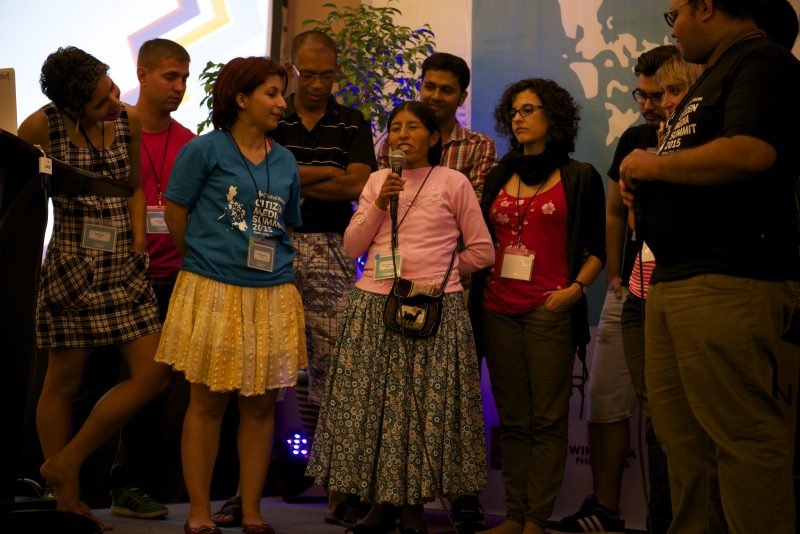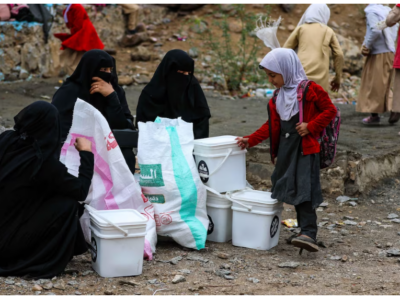
Victoria Tinta – Aymara Translation Manager – in Global Voices Media Summit in Cebu, the Philippines, 2015. Photo by Laura Schneider.
Tell us a bit about yourself and how you joined GV.
My interest was for my language, Aymara. I was also interested in the news because, through that, I could get informed about what is happening around the world.
Please tell us about the stages of your involvement within Global Voices. Did your experience of translating, writing and editing change your vision of the world during this time?
My experience in translation is very broad, but the first summary was not easy to translate into the Aymara language because there were technical and technological words that don't exist in the Aymara language. So, thinking of how to express this hasn't been so easy. In the case of Aymara language, it takes more time that what it takes in Spanish. In some translations, I couldn't correctly understand what's written and sometimes it wasn't so clear. At the beginning, I thought to be doing well. My difficulties began when I found the errors. Currently, I choose a post that I can understand well. I read it first in Spanish, and if I understand it, I translate it.
Does your work with GV impact your job? Did the social media scene change a lot in your region since, say, 2009?
Well in the year 2009 not much; But currently yes.
Could you also elaborate somewhat on how you manage your own time for all these tasks, including your work as a linguist? Any tips?
I carry out my translation work out of my day job hours, that is, I do my translations in my free time.
How did this urge lead you to Global Voices?
I love translating news, and Global Voices gives a light to people that are different from other media. They do not report all the views GV covers.
What were your previous experiences translating? Was it very different from what you had done before?
I used to translate a post that caught my attention, but I stumbled upon the technical words that were difficult to translate. Now, I do not do choose a post without reading it and making sure I can fully understand it.
And your experience in GV, do you think it is useful in other aspects?
If it is very useful.
Why do you think a man in the street should read GV in your language?
The posts that are written and translated into the Aymara language are important. If you read GV Aymara, you can get informed about what is happening in the world.
How did you decide to start translating Global Voices posts?
It was easy, I like to translate.
What do you do when you're not translating?
When I am not translating, I dedicate myself to my daily activities.
What are your dreams?
Continue working, have more volunteers in Aymara Lingua. For more information or when I haven't heard the news or I haven't seen the television, I browse GV to inform myself of what was happening in Venezuela, for instance.
How do you prefer to spend your free time? Give us an example of your average day.
My free time is when I do not have any work, and that doesn't happen too frequently. Sometimes, it will be one or two hours, and at that time I go on and translate or edit the translations sent by the volunteer translators.
How do you see GV Lingua progressing over the next few years?
I see there is a progress, although there are many languages that are not present in GV.
Multilingualism is also at the heart of your concerns. Why is multilingualism important?
If it is within my concerns. It is important to master several languages to have direct communication with other people.
What is the GV spirit?
The GV spirit for me is a voluntary force by volunteers all over the world who love their language, who write the posts and translate them into different languages.
How do you pick posts to translate and why did you choose to volunteer this way?
I choose the posts that have an impact on society. I like to translate more information or news.
You've been translating for GV for several years, what would you say to those just starting out?
For those who are starting, I'd tell them they are going to gain many experiences from all over the world.
Tell us about the city you live in. And how would you describe your country to a foreigner?
My country has a very important culture, in gastronomy, agriculture, dances, livestock and among others there is the linguistic diversity, where the country's multilingualism is expressed in 37 official languages!
Anything else you'd like to add?
I want to tell the GVers of the world to go ahead with this volunteer work, and the leaders say thank you for your understanding, especially to Mohamed who understood a lot about my situation, when sometimes I can't submit my reports for any reason.



